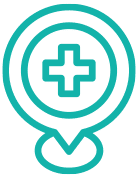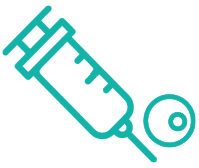Egg Donation Process
Thank you for considering donating your eggs with us. At Pinnacle Egg Bank, we run our egg donation program with the utmost care and support for our egg donors. You will work directly with one of our Pinnacle Fertility network physicians, and we will assign you a nurse who will be there to guide and support you throughout your entire egg donation process.
If you feel that you meet our basic egg donor qualifications and want to know what it takes to become an egg donor, read our step-by-step process of donating eggs below. Please keep in mind that this information is a set of general guidelines, and each egg donation process, including the egg donor medications protocol, may vary based on the individual circumstances of the egg donor and the recipient.
Egg Donation Process


Baseline Test
On the second or third day of your period, you will visit one of our clinics for a transvaginal ultrasound and blood tests. If everything looks as expected, you will start birth control pills. The purpose of birth control pills is to prevent you from ovulating and to help schedule your egg donation cycle. You will take the prescribed pills typically for about two to three weeks. If you are already taking birth control pills, your nurse will instruct you when to restart the pills.

Ovarian Suppression
Near the end of your birth control pill prescription, you will come back to our clinic for another ultrasound and more blood tests. This step helps ensure that the pills worked properly and that all of your egg follicles are the same size.

Ovarian Egg Follicle Stimulation
Approximately four days after your last birth control pill, you will start taking daily injections of a fertility hormone called FSH. Women normally make only enough FSH to cause one egg follicle to grow and ovulate per month, despite there being many egg follicles available. The egg follicles that do not grow will ultimately die, and will be discarded with your period that month. By giving extra FSH in the form of an injection, we are able to recruit multiple egg follicles to grow. The egg follicles that grow are the ones that would otherwise die, therefore donors do not lose any additional eggs through the process of donating eggs.
Over the ten to twelve day period while you are taking FSH injections, you will need to come to the clinic four to five times for further ultrasounds and blood tests. We will monitor you closely to ensure that you are on the right dose of FSH, that your egg follicles are growing and that your egg donation side effects, if any, are minimal. Once the egg follicles grow to the required size, we will administer a ‘trigger shot’ of human chorionic gonadotropin (hCG). The egg retrieval procedure will take place thirty-six hours later.

Egg Retrieval
Egg retrieval, which is the final step in the process of donating eggs, is performed exactly thirty-six hours after hCG injection. Although we do not use general anesthesia for the egg retrieval procedure, we will administer intravenous medication for sedation. Our physician will pass a catheter through your vagina and into your ovaries and use a suction-based method to remove the eggs from the egg follicles. The egg retrieval procedure takes approximately 15 minutes, and you will not feel any pain.
After an approximately one hour rest, you will be able to leave the clinic. Since some effects of the sedation can linger for a while, you will need to arrange for a ride home rather than drive yourself. You may feel some mild cramping over the next couple of days after the egg retrieval procedure, and one to two weeks later, you will have a period.

Risks of egg donation
The process of donating eggs is safe. The first baby from egg donation was born in 1984, and physicians complete over 20,000 egg donation cycles each year in the United States. There aren’t any long-term known side effects to be associated with egg donation. Having successfully cared for hundreds of egg donors across the last few years, our medical team has a tremendous amount of experience.
Contrary to what you may imagine, the process of egg donation does not lower your egg reserve. Only eggs that would have been naturally discarded during your donation month are stimulated to grow and be retrieved. Although you may temporarily experience some side effects of the medication that you take throughout your process of donating eggs, egg donation is not associated with future infertility, cancer, or any other long-term egg donation risk.
Most donors will experience some degree of tiredness and bloating during the FSH injections. Other symptoms such as Ovarian Hyperstimulation Syndrome, a condition characterized by the accumulation of fluid in your abdomen, is now very uncommon with the use of newer treatment protocols and careful monitoring.
After completing the process of donating eggs, you can continue with your normal activity. However, you must be cautious about sexual activity, alcohol intake and certain forms of exercise, such as extreme sports and kick-boxing.. Our medical team will explain these precautions in detail when you begin the egg donation process.
Are You Ready to Start Your Egg Donation Process?
If you have any questions about the process of donating eggs or you are ready to begin your journey, we are here for you. Please contact our Egg Donation Coordinator or call us at 424-385-0100. You can also submit a short online egg donor application form, and we’ll be in touch with you straight away.

